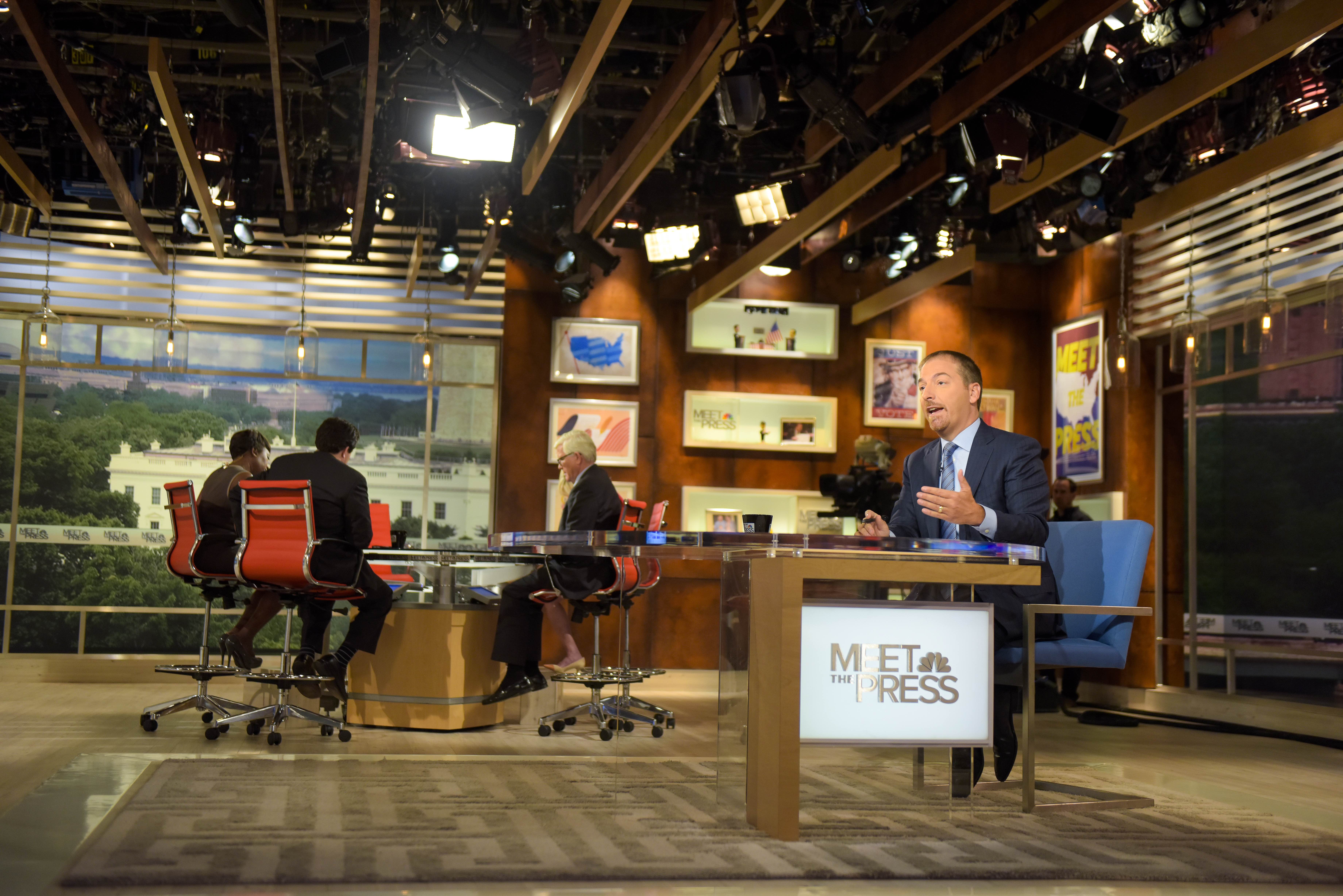“Meet the press:” Chuck Todd on the election

Chuck Todd is moderator of “Meet the Press” on NBC, the longest-running program in U.S. television history, and hosts “MTP Daily” weekday nights on MSNBC. He is the political director at NBC News and serves as an on-air political analyst for “NBC Nightly News” and “Today.” Todd is responsible for all aspects of NBC News’ political coverage. Todd will be co-anchoring NBC’s “Decision Night in America” coverage of Election Night tomorrow, starting at 7 PM ET.
The Liberty Champion was contacted by NBC News’ public relations team offering an over-the-phone interview with Chuck Todd. This is a transcript of the phone interview between Champion News Editor Will Young and Todd that took place Thursday Nov. 3. The transcript has been edited for length and grammar.
In the past few weeks, we have seen some of the polls between Hillary Clinton and Donald Trump close. Some polls have seen a virtual tie. How much fluctuation do you think will happen until Tuesday. Could we see Donald Trump ahead in some major polls right up to Tuesday?
I equate the last week of the campaign with the phrase “fog of war” in that it’s a tough week to poll, so I’m always very weary of a lot of the polling that I see in the last week, even from some good pollsters. In different ways people try to come up with likely voter models, and I’m very skeptical of focusing on just one.
Now, big picture. Clearly this race is tightening. I believe that we will never know, because of the Comey news, for sure whether this was happening on its own. There was evidence of tightening happening before Comey, but I don’t think we will ever be able to separate out whether this was Comey related or if it was just Republicans coming home when the history of this election is written.
If you back up further, you had your core Clinton supporters and your core Trump supporters. Then you had the people that were sitting in third party: maybe Gary Johnson or Jill Stein voters, and undecided voters. There were about one to five voters like that. I think that when you saw Hillary Clinton come up with a big lead after all of those attacks on Trump after the debates, she essentially picked up all of those voters that were leaning on Clinton but weren’t completely there yet. The rest of the folks there were Republican-leaning voters that just weren’t big Trump fans.
The question has always been, “Are they coming? Are they going to get there in time for Trump? Will they just not vote?” Those were some of the concerns among Republicans that I talked to two weeks ago. Well they started to come, and you could see that there was closing happening before Comey. I think Comey accelerated it, but we will never know for sure whether it is completely Comey. I’m a little cautious about saying it’s all because of that reason.
I think we were going to see this tighten either way. I still think she has a durable lead, but it’s certainly smaller right now, that’s for sure.
At Liberty University, most students describe themselves as young evangelicals. What kind of impact do you think the evangelical vote will make in this race compared to past races?
If Trump comes up short, I believe it will be because of voters who care about social issues, who care about morality. Whether it’s evangelicals or Mormons if you look out west, there’s definitely a lack of enthusiasm there.
I am very curious of how evangelical women will vote, particularly in some states like Florida or Virginia and in North Carolina because they are battleground states anyway. I don’t know if they will vote for Clinton or sit out and skip the presidential election. I have to say that post-election, I think the political side of the evangelical movement is going to be interesting to see as a political observer.
I think there is going to be this back-and-forth of “What is the future of the political side of the evangelical movement?” Especially if Clinton wins, you can look at the issues that the Supreme Court will decide and where society is moving towards on certain issues such as marriage.
After the election, I think the leaders of the evangelical movement will have a lot of questions to answer for. Did they rally around Trump too quickly? I just think there’s going to be a lot of debate internally, and I think there’s going to be some fracturing there among the leadership.
If Trump loses, different parts of the conservative movement are going to have these sort of “time to look ourselves in the mirror” moments, and evangelical leaders will have that moment themselves.
There is a lot of discussion around the future of the Republican Party post-election. Depending on whether Trump wins or loses, what do you think the future of the GOP holds?
I think that the Republican Party has an identity crisis, but I also think the Democratic party has its own identity crisis. You can make an argument that in the last 40 years of American politics, the red-blue divide over this country has been over social issues. What your position was on various social issues defined you as a Republican or Democratic voter.
There’s a lot of evidence, particularly with younger conservatives, that some of these social issues that have been the most divisive over the past 40 years just aren’t in the forefront of the minds of especially younger evangelicals or younger conservatives.
I think, generationally, there is a split on that. For the younger generation, they are saying “Well, it’s settled.” That doesn’t mean they are necessarily happy about it, but it’s settled and the rest of the country has moved on. Well the question then becomes “What is going to define a Republican and what is going to define a Democrat?” I think that it’s going to be economic issues, and we’ve gotten a taste of it.
I believe there’s a chance that we look back at this election in 40 years and say that 2016 was the beginning of the reorganization of the two parties. And you will have one party that is maybe more internationalist and open to the global economy, and the other party that says, “Hey we have to slow down here.” I’m not saying that it’s full-fledged nationalism, but it’s more like “Hey, let’s tap the brakes here.” But the point is that your place on the economic ladder is what is going to push you toward one party or the other. It’s not going to be so much a social issue in the future.
In terms of that, do you think it is likely that social groups like the pro-life movement will give it up?
I don’t know if those groups will give it up, but I think there will be a sense that the battle is lost on a legal sense, and that they will question over whether or not there is a different way to tackle the abortion issue.
Perhaps the movement will try to find out a different way to focus that energy. I don’t want to leave you with the impression that these debates are going away in the next couple of years — they’re not — but look at Donald Trump’s candidacy. This was not a candidacy that was based on social issues at all.
While the platform still read as a socially conservative platform, that isn’t what the RNC convention showcased. There was more of a message that it is time to embrace gay America, and I even think they were featuring some pro-choice speakers at that convention as well.
The point is that Trump was not penalized inside these Republican primaries for his lack of conviction on these issues. I think that everyone in the movement knows that Trump just came to these social issues out of a necessity, and that tells you everything. It wasn’t at the forefront of his mind, and yet he was able to grab this nomination rather easily. I think the energy in American politics, both on the left and the right, is going to be economically based.
You also said recently that Virginia will be a good indicator of how close Trump will be to Clinton in other states on election day. What’s your reasoning behind that?
I was asked, “What early state would tell us whether or not Trump was having a good night, and I said that if we couldn’t call Virginia pretty quickly, then that would be a good sign. Even if Clinton carries Virginia, but it’s extraordinarily close, then that will tell me that African-American turnout was down in Virginia, and it could be down all over. It would tell me that Republican voters are a little more motivated than the polls have indicated, and it would also tell me that a lot of evangelicals are showing up to the polls.
Virginia has a couple of interesting microcosms with the African-American vote and the evangelical vote that will give us a sign of just how other states will go as well. Right now, all the evidence points to Clinton carrying Virginia. The faster or slower that we call Virginia will tell us how well Trump will do in the rest of the states.
